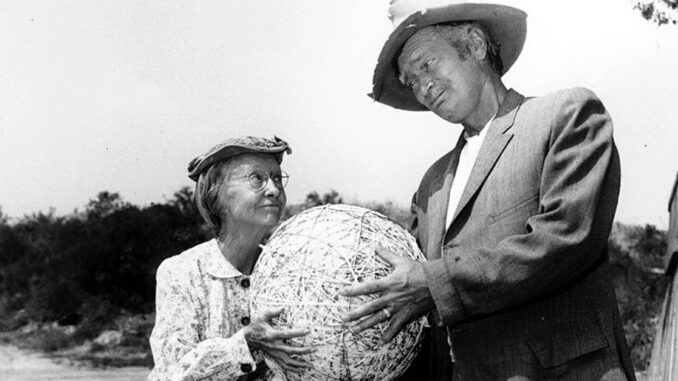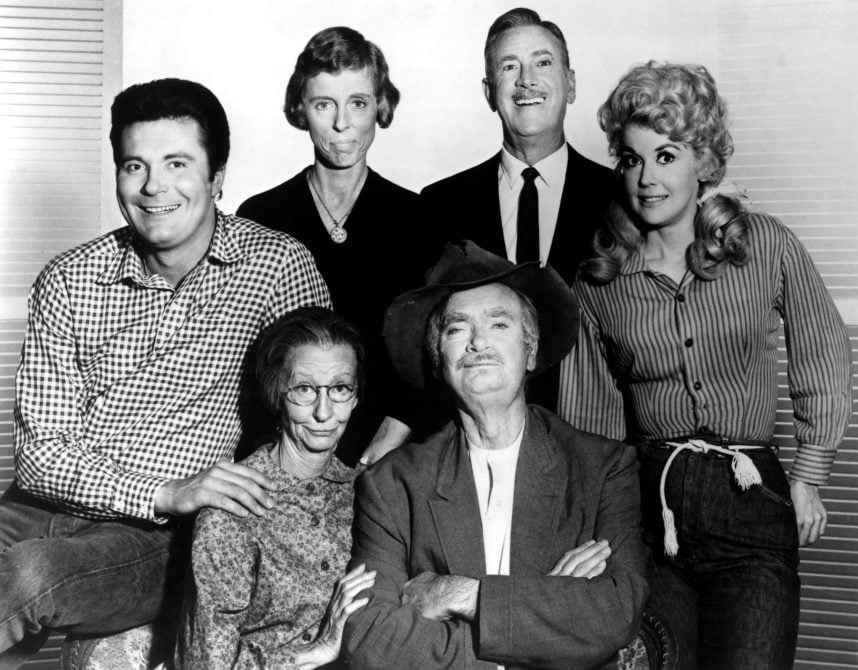
Donna Douglas, the Fairest ‘Beverly Hillbilly,’ Dies at 82
Donna Douglas, who played the shapely, blue-eyed daughter of the suddenly wealthy mountaineer Jed Clampett on “The Beverly Hillbillies,” the wildly popular television sitcom of a half-century ago, died on Thursday in Baton Rouge, La.

But the show’s fans, many of them children who grew up watching it, remained fond of the series (it was later broadcast in reruns), and long afterward Ms. Douglas would make occasional public appearances in an Elly May costume. She also recorded gospel songs in her later years.
She was born Doris Smith in Pride, La., in September 1932, and graduated from Redemptorist High School in Baton Rouge. She was crowned Miss New Orleans and Miss Baton Rouge in beauty contests.
Her marriages to Roland Bourgeois and Robert M. Leeds ended in divorce. She is survived by a son, Danny Bourgeois; a brother, Emmett R. Smith Jr.; two granddaughters; a grandson and two great-grandchildren.
Ms. Douglas also made a brief but memorable appearance in a classic episode of Rod Serling’s “The Twilight Zone” in 1960. Titled “Eye of the Beholder,” the episode, which takes place in a nightmarish world, is a parable about relative standards of beauty. Ms. Douglas plays a woman whose head is wrapped in bandages after plastic surgery is performed to correct her ugliness; when the bandages are removed, she is revealed to be beautiful, while the doctors and nurses tending her are — by this world’s standards, not theirs — grotesque.
Ms. Douglas also had roles in “Lover Come Back,” a 1961 movie starring Rock Hudson, and “Frankie and Johnny,” a 1966 film in which she and Elvis Presley play riverboat performers.
But she would be forever known as Elly May, even to reporters and headline writers. In 2011, when Ms. Douglas sued Mattel, the manufacturer of the Barbie doll, alleging that the dollmakers had used her likeness without her permission, The New York Times ran an article under the headline, “Feudin’ and Fussin’ Over a ‘Beverly Hillbillies’ Barbie Doll.”
“Y’all get a good intellectual property lawyer now, you hear?” the article began. (The suit was eventually settled. )
Ms. Douglas never resented being typecast.
“So many kinds of people relate to Elly May,” she said in the A.P. interview. “So many people love her, and that means a lot to me.”
But the show’s fans, many of them children who grew up watching it, remained fond of the series (it was later broadcast in reruns), and long afterward Ms. Douglas would make occasional public appearances in an Elly May costume. She also recorded gospel songs in her later years.
She was born Doris Smith in Pride, La., in September 1932, and graduated from Redemptorist High School in Baton Rouge. She was crowned Miss New Orleans and Miss Baton Rouge in beauty contests.
Her marriages to Roland Bourgeois and Robert M. Leeds ended in divorce. She is survived by a son, Danny Bourgeois; a brother, Emmett R. Smith Jr.; two granddaughters; a grandson and two great-grandchildren.
Ms. Douglas also made a brief but memorable appearance in a classic episode of Rod Serling’s “The Twilight Zone” in 1960. Titled “Eye of the Beholder,” the episode, which takes place in a nightmarish world, is a parable about relative standards of beauty. Ms. Douglas plays a woman whose head is wrapped in bandages after plastic surgery is performed to correct her ugliness; when the bandages are removed, she is revealed to be beautiful, while the doctors and nurses tending her are — by this world’s standards, not theirs — grotesque.
Ms. Douglas also had roles in “Lover Come Back,” a 1961 movie starring Rock Hudson, and “Frankie and Johnny,” a 1966 film in which she and Elvis Presley play riverboat performers.
But she would be forever known as Elly May, even to reporters and headline writers. In 2011, when Ms. Douglas sued Mattel, the manufacturer of the Barbie doll, alleging that the dollmakers had used her likeness without her permission, The New York Times ran an article under the headline, “Feudin’ and Fussin’ Over a ‘Beverly Hillbillies’ Barbie Doll.”
“Y’all get a good intellectual property lawyer now, you hear?” the article began. (The suit was eventually settled. )
Ms. Douglas never resented being typecast.
“So many kinds of people relate to Elly May,” she said in the A.P. interview. “So many people love her, and that means a lot to me.”
Ms. Douglas, who lived in the Baton Rouge suburb of Zachary, had pancreatic cancer and died in a hospital, her niece Charlene Smith said. Though other sources listed her as 81, Ms. Smith said her aunt was 82.
Ms. Douglas appeared in various movie and television roles before and after “The Beverly Hillbillies,” which ran on CBS for nine seasons. But she was destined to be forever remembered as Elly May Clampett, the lovely ingénue of the Ozarks.
She was chosen for the part from among hundreds of actresses, and in her view it was her small-town Southern upbringing that had made her a natural for the part. During her audition, she was asked to milk a goat.
“I had milked cows before,” she told The Associated Press in 2009. “I figured they were equipped the same, so I just went on over and did it.”
How The Times decides who gets an obituary. There is no formula, scoring system or checklist in determining the news value of a life. We investigate, research and ask around before settling on our subjects. If you know of someone who might be a candidate for a Times obituary, please suggest it here.
“The Beverly Hillbillies” burst upon the scene on the evening of Sept. 26, 1962. “In tonight’s fun-filled premiere, Buddy Ebsen stars as the head of a proud hillbilly clan that discovers an oil well at home that leads to a new home in Hollywood!” a CBS print advertisement proclaimed. Other cast members included Irene Ryan as the flinty matriarch Granny and Max Baer Jr., as the bumpkin cousin Jethro Bodine.
At its height, in the ’60s, “The Beverly Hillbillies” was a family favorite watched by millions. But by the end of a decade marked by assassinations, urban riots and the Vietnam War, American tastes were moving away from such innocent, cornpone fare, and the series ended in 1971. An effort to revive it in the fall of 1981, through a two-hour movie pilot titled “The Return of the Beverly Hillbillies,” fell flat.
But the show’s fans, many of them children who grew up watching it, remained fond of the series (it was later broadcast in reruns), and long afterward Ms. Douglas would make occasional public appearances in an Elly May costume. She also recorded gospel songs in her later years.
She was born Doris Smith in Pride, La., in September 1932, and graduated from Redemptorist High School in Baton Rouge. She was crowned Miss New Orleans and Miss Baton Rouge in beauty contests.
Her marriages to Roland Bourgeois and Robert M. Leeds ended in divorce. She is survived by a son, Danny Bourgeois; a brother, Emmett R. Smith Jr.; two granddaughters; a grandson and two great-grandchildren.
Ms. Douglas also made a brief but memorable appearance in a classic episode of Rod Serling’s “The Twilight Zone” in 1960. Titled “Eye of the Beholder,” the episode, which takes place in a nightmarish world, is a parable about relative standards of beauty. Ms. Douglas plays a woman whose head is wrapped in bandages after plastic surgery is performed to correct her ugliness; when the bandages are removed, she is revealed to be beautiful, while the doctors and nurses tending her are — by this world’s standards, not theirs — grotesque.
Ms. Douglas also had roles in “Lover Come Back,” a 1961 movie starring Rock Hudson, and “Frankie and Johnny,” a 1966 film in which she and Elvis Presley play riverboat performers.
But she would be forever known as Elly May, even to reporters and headline writers. In 2011, when Ms. Douglas sued Mattel, the manufacturer of the Barbie doll, alleging that the dollmakers had used her likeness without her permission, The New York Times ran an article under the headline, “Feudin’ and Fussin’ Over a ‘Beverly Hillbillies’ Barbie Doll.”
“Y’all get a good intellectual property lawyer now, you hear?” the article began. (The suit was eventually settled. )
Ms. Douglas never resented being typecast.
“So many kinds of people relate to Elly May,” she said in the A.P. interview. “So many people love her, and that means a lot to me.”